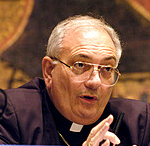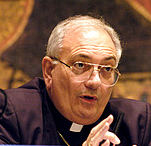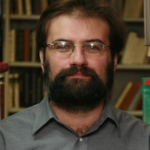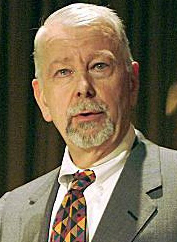
Deprecated: trim(): Passing null to parameter #1 ($string) of type string is deprecated in /home/aoiusa/public_html/wp-content/plugins/sexybookmarks/public.php on line 388
Deprecated: trim(): Passing null to parameter #1 ($string) of type string is deprecated in /home/aoiusa/public_html/wp-content/plugins/sexybookmarks/public.php on line 394
Deprecated: trim(): Passing null to parameter #1 ($string) of type string is deprecated in /home/aoiusa/public_html/wp-content/plugins/sexybookmarks/public.php on line 400
So far the only Orthodox bishops offering more than pro-forma defenses of the moral tradition are Met. Job and Bp. Michael of the OCA. Below is an example of how moral authority is rightly exercised. Roman Catholic Bp. Nicholas DiMarzio offers a very reasoned and accessible analysis and defense of the major points in the same-sex marriage debate. Some highlights:
We who oppose same-sex marriage are not callous to the very real longings for friendship, affection and belonging that proponents of this legislation espouse. We have, in part, failed as the proponents of the historical understanding of marriage as that between a man and a woman precisely because we have sought to be sensitive to those who have same-sex attractions. Perhaps we must now speak more forcefully and clearly.
I believe the passage of same-sex marriage is another “nail in the coffin” of marriage. It is destructive because it shows a failure to view marriage in the context of a vocation: a calling to participate in the great enterprise of forming the next generation.

Source: Washington Post
When Jesus was confronted with the legal question whether “as Jews, could they pay taxes to the Roman conquerors,” He asked for a coin and said: “Whose image is here?” Then He said: “Pay Caesar what belongs to Caesar and to God what belongs to God.” (Mk. 12:17) This enigmatic saying perhaps needs some explanation. It is the basis of this saying of Jesus that I can address issues of the relationship between church and state, issues between morality and law, between individual conscience and politics.
If we were to simply interpret Jesus’ saying, one may say that since Caesar’s image is on the coin, it belongs to him and there is no more need to discuss the question; however, a deeper understanding of the Jewish reluctance to pay tribute is that they were not supposed to carry or look at coins with images of any kind. More importantly, however, is Jesus’ emphasis that the things of God must be given to God, as He emphasizes in His proclamation about the Kingdom; it is the Kingdom of God that we must seek. The Kingdom of God is not the kingdoms of this earth or the dominion of earthly powers. Rather, our emphasis in the long run must be on establishing the kingdom that has no earthly form, but rather one that recognizes God as the almighty and all powerful.
In various places in Scripture, St. Paul insists on the divine origins of civil authority. This, however, applies only to legitimate civil authorities, not one that is despotic or does not support the human dignity of every individual. Justice for individuals and society is not so difficult to define. It comes from the point of view that we see justice when each person in society is given his due and his rights are not violated. Justice is, however, more difficult to see in our society when the relationship between individual and society are on a collision course. Where can justice be found?
In the Catholic tradition, the human dignity of the individual is the starting point of all moral and ethical reasoning. At the same time, however, an individual’s rights, which stem from his personal dignity, cannot be asserted above the common good of the society in which we live. Our citizenship is a matter of shared relationship and responsibilities of persons working for the common good. Individuality cannot exist outside of the person and prior to our social relationships with one another. It is a delicate balancing act that we must perform in order to find justice for individuals, but also for our society and for the effects of one man’s rights on the rights of another. You have dedicated your life to this principle of justice.
The law, however, is the servant of justice in our land and laws are not always made with the intention of carrying out justice, but rather influenced by all sorts of extraneous influences. That our democracy has survived for over 200 years may be due to the fact that we are able to change our laws. The democratic process produces them but the democratic process also changes our laws. Of course, we base ourselves on the Constitution, the Bill of Rights and the Declaration of Independence, all of which in their essence derive their understanding from the common good. To quote the Declaration of Independence, “each man is endowed with certain unalienable Rights that among these are Life, Liberty and the pursuit of Happiness.” These rights of man are “self-evident” because they can be discerned through the natural law by all men of good will. Natural law is that law which exists in the hearts of men, which allows them to be in relationship with others in an equitable way.
We who oppose same-sex marriage are not callous to the very real longings for friendship, affection and belonging that proponents of this legislation espouse. We have, in part, failed as the proponents of the historical understanding of marriage as that between a man and a woman precisely because we have sought to be sensitive to those who have same-sex attractions. Perhaps we must now speak more forcefully and clearly.
[pullquote]How true it is that the separation of church and state is a fundamental principle of our democracy and that no religion should be established by the state. The “invisible wall” that Thomas Jefferson espoused was intended to protect the believer and the unbeliever from the tyranny of the state, so that all churches, all religions and our democracy could have an equal opportunity to seek justice in the greater entity, which is society itself.[/pullquote]
I believe the passage of same-sex marriage is another “nail in the coffin” of marriage. It is destructive because it shows a failure to view marriage in the context of a vocation: a calling to participate in the great enterprise of forming the next generation.
Sociologists and psychologists agree that stable families where a mother and father live together in a loving union are a key predicator of a child’s future health, well being and success. In other words, these are the best or ideal circumstances for our children. We should strive to foster this type of family structure.
Tragically, we no longer understand the primary purpose of marriage as the institution by which a man and woman bring new life into the world and teach the child to become a productive citizen.
Hopefully, our society can continue to recognize that the common good is what we pursue when seeking justice. This means never violating the rights of the individual, while at the same time never forcing society to abandon its responsibilities to its members because of the desire of an individual.
There are many dichotomies that appear when we look more closely at the pursuit of justice, especially when we seek to inject the issue of religion. From the time we are young, our parents admonish us not to speak about politics or religion in polite company. That fact is that politics and religion are the life blood of society. Both of these entities deal with our relationship with one another; politics and religion are intertwined. Relationship is key to understanding our pursuit of justice.
How true it is that the separation of church and state is a fundamental principle of our democracy and that no religion should be established by the state. The “invisible wall” that Thomas Jefferson espoused was intended to protect the believer and the unbeliever from the tyranny of the state, so that all churches, all religions and our democracy could have an equal opportunity to seek justice in the greater entity, which is society itself.
[pullquote]So churches have every right to be involved in the political process, but operate under regulatory as opposed to constitutional constraints. We choose not to be involved in the election and defeat of candidates for public office, but that does not mean that we cede our “rights” to be involved in public discourse of policy matters important to Catholics and people of faith. Indeed, it is impossible that religion and politics not interface with one another.[/pullquote]
The government is merely the operational modality of the state that serves a greater society. So, we must assent that religion has a place in society, for religion and society truly are inseparable.
It is not the “Establishment Clause” that impedes the church’s ability to influence the political process but rather Internal Revenue Service regulations that threaten our “tax exempt” status.
So churches have every right to be involved in the political process, but operate under regulatory as opposed to constitutional constraints. We choose not to be involved in the election and defeat of candidates for public office, but that does not mean that we cede our “rights” to be involved in public discourse of policy matters important to Catholics and people of faith. Indeed, it is impossible that religion and politics not interface with one another.
Perhaps the best example of how they do interface is the example of how laws are made. There are those who assert that religion and morality are inseparable and therefore without religion there can be no set laws, which can regulate interaction with another. It is the natural law and not religion that is the fundamental building block of morality. It is the conscience of man, which always seeks the good, although many times not achieving it.
The late Doctor Martin Luther King reminded us of the primacy of conscience when he said on April 16, 1963 in a Letter from a Birmingham Jail, “One has not only a legal but a moral responsibility to obey just laws. Conversely, one has a moral responsibility to disobey unjust laws. I agree with St. Augustine ‘an unjust law is no law at all.’”
Had people of faith, like King, not lead and collectively opposed unjust laws neither the Abolitionist Movement of the 19th Century nor the Civil Rights movement of the 20th Century would have been successful.
Another difficulty we face is the correct place of religious professionals in politics. The principle of the separation of church and state does not preclude a religious leader from seeking to influence political decisions. In recent years, there is an unfortunate distinction between private or personal morality and public morality. Moreover, the popular culture makes sacrosanct the claim of individual freedom.
We ought to ask ourselves, is it possible to divorce an individual’s private moral convictions from his decisions about public policy? Does the same also hold true for persons with non-religious values? Is one value more important than another? Are religious values of less importance than the value of personal freedom? These are the questions that confront us today. How can we find a way to enunciate moral principles in our society today?
Political and legal strategies to codify moral principles or value principles are the work of not only legislators, but also of those who they represent. So, we return to where we began. How can we pay “Caesar the things that are Caesar’s and to God the things that are God’s”? Certainly, it is by engaging ourselves in the things that belong to Caesar, society and law, so that truly we can render to God the things that belong to God.

Nicholas Dimarzio is bishop of the Roman Catholic Diocese of Brooklyn. In protest of New York state’s recent legislative measure endorsing same-sex marriage, the bishop has asked his diocese to“not to bestow or accept honors, nor to extend a platform of any kind to any state elected officials, in all our parishes and churches for the foreseeable future.” Read On Faith’s debate of this church and state battle here.





